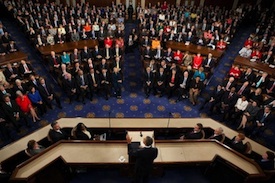Obama Proposes $25 Billion for School Upgrades
 WASHINGTON — President Barack Obama recently announced a $447 billion “American Jobs Act” proposal, including a $25 billion investment to modernize at least 35,000 public schools to create jobs while improving classrooms and updating technology needs.
WASHINGTON — President Barack Obama recently announced a $447 billion “American Jobs Act” proposal, including a $25 billion investment to modernize at least 35,000 public schools to create jobs while improving classrooms and updating technology needs.
In addition to giving priority to rural schools and dedicated funding for Bureau of Indian Education-funded schools, the bill would allow funds to be used for emergency repair and renovation projects, greening and energy efficiency upgrades, asbestos abatement and removal and modernization efforts to build new science and computer labs and to upgrade technology.
Urging Congress to pass the bill as soon as possible, the president outlined various projects in his speech on Thursday, including a $5 billion investment in modernizing community colleges, including tribal colleges.
“There should be nothing controversial about this piece of legislation,” the President said in his speech. “Everything in here is the kind of proposal that’s been supported by both Democrats and Republicans — including many who sit here tonight. And everything in this bill will be paid for.”
The president said the purpose of the act is to put more people back to work and more money in the pockets of those who are working, along with creating more jobs for construction workers, teachers, veterans, first responders and for the long-term unemployed.
“There are schools throughout this country that desperately need renovating. How can we expect our kids to do their best in places that are literally falling apart?” he said. “This is America. Every child deserves a great school — and we can give it to them, if we act now.”
In addition to the jobs created through roof and window repairs and upgrades, the bill could put thousands of teachers in every state back to work, the president said.
The logistics of the bill include providing tax credits to companies that hire new tax workers, tax relief to small business owners and tax cuts for the middle class, without adding to the deficit, he said.
The budget agreement passed in July will cut government spending by about $1 trillion over the next 10 years, and requires Congress to come up with an additional $1.5 trillion in savings by the end of December.
President Obama asked that Congress increase the amount to cover the full cost of the American Jobs Act.
The act is part of a “more ambitious” deficit plan the president said would cover the cost of this jobs bill, but stabilize our debt in the long run.
Jared Bernstein, a former administration economics advisor and a proponent of the school rehabilitation program, and senior fellow for the Center on Budget and Policy Priorities, a non-partisan research and policy group promoting the “Fix America’s Schools Today” initiative as the blueprint if Congress passes the act.
“Our schools need fixing, there are lots of people who do that kind of work that are unemployed, so the idea of marrying those two problems seemed like a partial solution to the very high unemployment rate we’re seeing in the economy in general and in construction work in particular,” he said.
Bernstein said there is currently a long backlog of repairs needed in schools that have faced budget constraints for a long time and continue to defer such maintenance.
“Children do better when their schools are in good repair – whether it’s energy savings, retrofit or insulate, fix leaks and roofs, maybe even put on solar panels geothermal pumps, it has a lasting value to schools,” he said.
Bernstein said the group has gotten positive feedback from some members of Congress.
“You want an infrastructure that can be stood up quickly,” he said. “Obviously this economic patient needs medicine right away.”
The president stated in his speech that the act was based on a bill written by a Texas Republican and a Massachusetts Democrat, adding that fifty House Republicans have proposed the same payroll tax cut outlined in the plan.
“The idea for a big boost in construction is supported by America’s largest business organization and America’s largest labor organization,” he added.
The bill would also speed up the process for contractors of the federal government to get paid faster, and cut red tape that prevents “too many rapidly growing startup companies from raising capital and going public,” he said.
He cautioned, however, that he would not wipe out basic protections that protect American citizens as workers and consumers.
